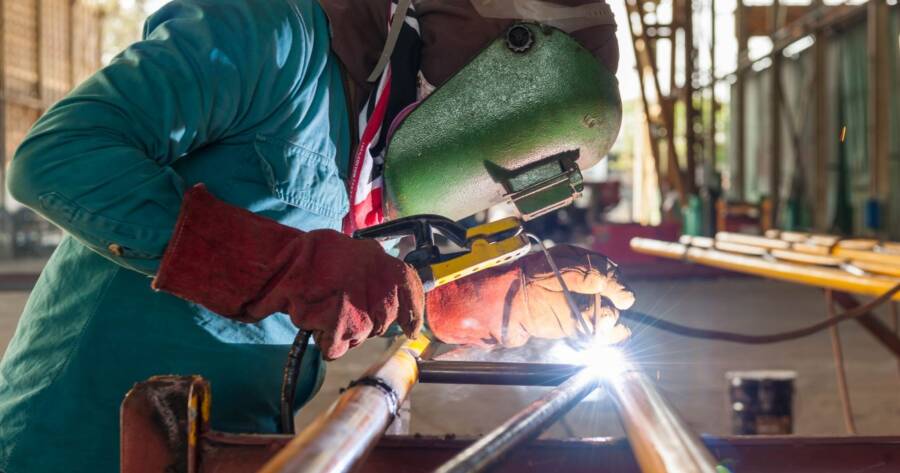Skilled tradesmen are always in high demand. Depending on your training, experience, and location, you could wind up with a six-figure income and job security for life. Best of all, most jobs in the skilled trades don’t require a bachelor’s degree.
Here are three examples that might spark your interest.
Electrician
There are dozens of jobs across all industries for qualified electricians. Anyone who has electrical service will need a skilled installer and repairman, so the possibilities are endless.
A typical day might include some of the following tasks:
- Reading blueprints or diagrams
- Installing, maintaining, or repairing electrical wiring
- Installing lighting, entertainment, or home security systems
- Inspecting circuit breakers, transformers, or other components
- Testing systems and diagnosing problems using ammeters, voltmeters, cable testers, and thermal scanners
- Working with hand and power tools such as conduit benders, screwdrivers, drills, saws, and wire strippers
- Training new electricians
Electricians may work alone or with others. If you’re a lone wolf, you could start your own company and troubleshoot problems in homes or small businesses. If you like being around people, you could help design systems for new construction. You would work with architects, engineers, HVAC technicians, or elevator installers. You could always work for an energy company, the government, or the military.
Being an electrician is not without its challenges. Following safety rules to prevent injury is obviously crucial. Maintaining equipment in existing buildings is a true test of an electrician’s dexterity. Getting to hard-to-reach places might entail crawling, climbing, or maintaining one’s balance, so physical fitness is a must. Also, since electricians must be able to distinguish one wire from another, they can’t be color-blind.
Most states require electricians to be licensed. Preparation includes training in a technical school and completing an apprenticeship. You might need specialized training for communication equipment, elevator systems or fire alarm systems.
In 2017, the average annual salary was $54,110. Electricians in some cities, such as San Rafael, California, earn as much as $100,500.
HVAC Technician
HVAC is short for heating, ventilation, and air conditioning.
A lot of science and skill goes into HVAC systems. Technicians keep the temperature and air quality in homes, businesses, schools, and hospitals safe and comfortable. Not only that, but reliable HVAC systems are necessary for transporting foods, medicines, and other perishables.
Many workers specialize in either installation or repair and maintenance, but some increase their earning power by training to do both. Still others focus on just one kind of system such as refrigeration or heating.
High school students who are interested in HVAC work should pay extra attention in math, chemistry, electronics, applied physics, and shop classes. Courses in blueprint-reading and mechanical drawing are also valuable in this career.
Typical duties include the following:
- Overseeing installations
- Diagnosing problems and repairing equipment
- Providing technical support
- Designing and installing low-voltage wiring
- Making after-hours visits
To work in HVAC, you must get professional training in a trade or technical school and complete a paid apprenticeship. The military also trains for HVAC careers. Most states have licensing requirements.
Here are some additional skills that come in handy:
- Listening and communicating
- Time management
- Working without supervision
- Following directions
- Having the strength to lift heavy equipment and ladders
- Being comfortable while working in crawl spaces or from heights
The median salary for HVAC work is $47,080, but some jobs pay as much as $66,569. Around one in 10 technicians are self-employed. The U.S. Bureau of Labor Statistics lists HVAC work as a Bright Outlook occupation; employment will grow at a rapid rate through at least 2024.
Welder
Welders are highly talented at shaping and joining metals using torches or lasers. There are numerous career paths for welders in just about all industries. Welders are needed everywhere from the bottom of the sea to outer space.
If you like traveling, there’s no shortage of opportunities. Welders go to industrial shutdowns, shipyards, pipeline construction sites, military bases, and offshore oil rigs. You might make repairs during a luxurious ocean cruise or you could even assist a NASCAR team with building cars.
Artisan welders build furniture and create the ironwork in homes and gardens. Some create original sculptures or other works of art. Welding is also compatible with the trend toward renewable energy technologies. There will always be green-collar jobs for welders.
As you can see, this is one of the most flexible career choices. You can change industries at any time without starting all over.
Training programs are offered by vocational schools, private welding schools, community colleges, and the military. Some employers offer on-the-job training. Depending on the level of skill required for a specific job or specialty, training could take just a few weeks or several years. Most employers require a physical welding test.
If you have these traits, you’ll probably make a good welder:
- Good manual dexterity
- Good eyesight and hand-to-eye coordination
- An eye for detail
- Strength and stamina
- An inquisitive mind and an interest in how things are assembled
- Problem-solving skills
Salaries in welding vary wildly. The median salary in 2017 was $40,240. Jobs in military support overseas can pay up to $160,000, and underwater welding could also result in a six-figure income.
It’s surprising how many high-paying skilled trades don’t require a college degree. The Internet is a valuable resource for finding them and launching an exciting career. So start your search today.
 ArhendriX / Getty Images
ArhendriX / Getty Images


